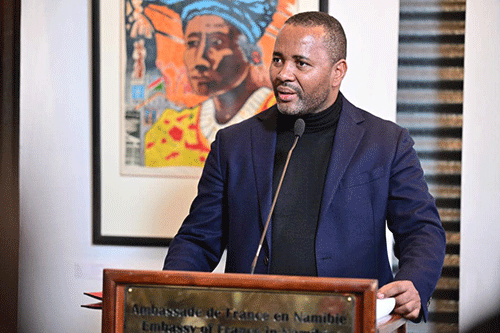Spokesperson in the Presidency Alfredo Hengari has warned the civil society to resist the temptation of becoming unelected politicians.
The presidential press secretary made these remarks while responding to concerns raised by civil society organisations and scholars over the “green hydrogen frenzy”.
About a week ago, the Economic and Social Justice Trust, Civic264+ and Germanwatch, in collaboration with scholars from Hamburg University of Technology, along with partners, organised a workshop in Windhoek.
During that workshop, they emphasised the need for more community consultations on green hydrogen initiatives.
They highlighted potential issues such as land conflicts, water disputes, political concerns and financial burdens associated with these initiatives.
The group also expressed concerns about an export-oriented approach potentially leading to extractive dynamics in the hydrogen economy, drawing parallels with past resource industries like fossil energy and diamond mining.
In a previous interview with New Era, a trustee of the Economic and Social Justice Trust Rinaani Musutua said “Green hydrogen is forced down our throats.”
A lot of people are left out of the process, she added.
“We do not know if the project is financially viable. We don’t know what the risks are, and we are not fully aware of the benefits. Things are not explained properly to the Namibian people; everything is forced down our throats,” Musutua charged.
She also feels “there is a lack of transparency, and so much secrecy”.
“What is out there are random questions, and we do not know if the project is feasible as no feasible study was done,” said Musutua.
The civil society is seeking answers from the government, saying at the moment, the information it has provided is sketchy.
Hengari, who was not pleased, perceived this as an attempt by civil society to take on the role of politicians.
“The Namibian government has been transparent in as far as green hydrogen is concerned. The President was in Lüderitz earlier this year to speak to communities and stakeholders, and the director general of the National Planning Commission has been undertaking roadshows across the country to speak to all interested Namibians and hear their views. So, I don’t know where the lack of transparency comes from,” he stated.
Tobias Kalt, a scholar from the Hamburg University, who together with other scholars is busy conducting research on the matter, has observed numerous promises being made by both the German government and the European Union to Namibia.
He said international partners’ primary focus is on securing a supply of green hydrogen to Europe at low rates, obtaining critical minerals, and facilitating investments by German technology companies in Namibia.
“We have found a significant lack of consideration for the well-being of the Namibian people. Our research finds that it is very much some extractive economy that is being set up to get to these resources, without contributing much to the development of the local economy,” said Kalt.
Hengari countered that this assertion is misplaced and inaccurate.
“We have no intention of offering these resources at lower rates. Our policy revolves around beneficiation, and green hydrogen emerges from the resources we plan to use for economic diversification and the betterment of local communities.”
Not elected
He went on to remind the civil society that they are not elected representatives.
“While the civil society certainly has a voice, they do not act as representatives of the sovereign population. Sovereigns elect their leaders to govern on their behalf, and do not seek co-governance from others. The President serves as the ultimate embodiment of our sovereignty,” the spokesperson emphasised.
Anyone could thus claim to be a member of civil society, he said, stating, “All it takes is a fax machine and a mobile phone, and one can lay claim to being part of civil society without possessing legitimacy or undergoing an election process. Our colleagues should heed this lesson, and resist the temptation to assume the role of unelected politicians. They must exercise caution, and refrain from speaking recklessly without factual basis and due consideration for the well-being of the Namibian people.”
Intentions clear
Hengari’s sentiments are in conformity with those of Green Hydrogen commissioner James Mnyupe, who last week told New Era that the launch of the Harambee Prosperity Plan II (HPII) has undertaken various initiatives to showcase its ambitions to incubate a new synthetic fuels industry and champion a green hydrogen programme – which aspires to promote a green industrialisation agenda.
“These efforts have the potential to create more than 280 000 jobs by 2030, bolster the GDP by more than US$4.1 billion, entrench energy security and diversify exports, leaving Namibia less vulnerable to external shocks,” he elucidated.
Namibia is currently hosting at least five prospective green hydrogen projects in both the //Kharas and Erongo regions.
“Those projects are responsible for mapping and engaging key stakeholders,” said Mnyupe.
The commissioner noted that each of these projects is engaging its own portfolio of stakeholders, as prescribed by the existing legislative landscape, to get broader community buy-in and de-risk the projects.
“Some projects have gone beyond engaging stakeholders such as local communities and have partnered with some communities, and indeed have even started employing people from the said communities,” he noted.
- ashikololo@nepc.com.na


